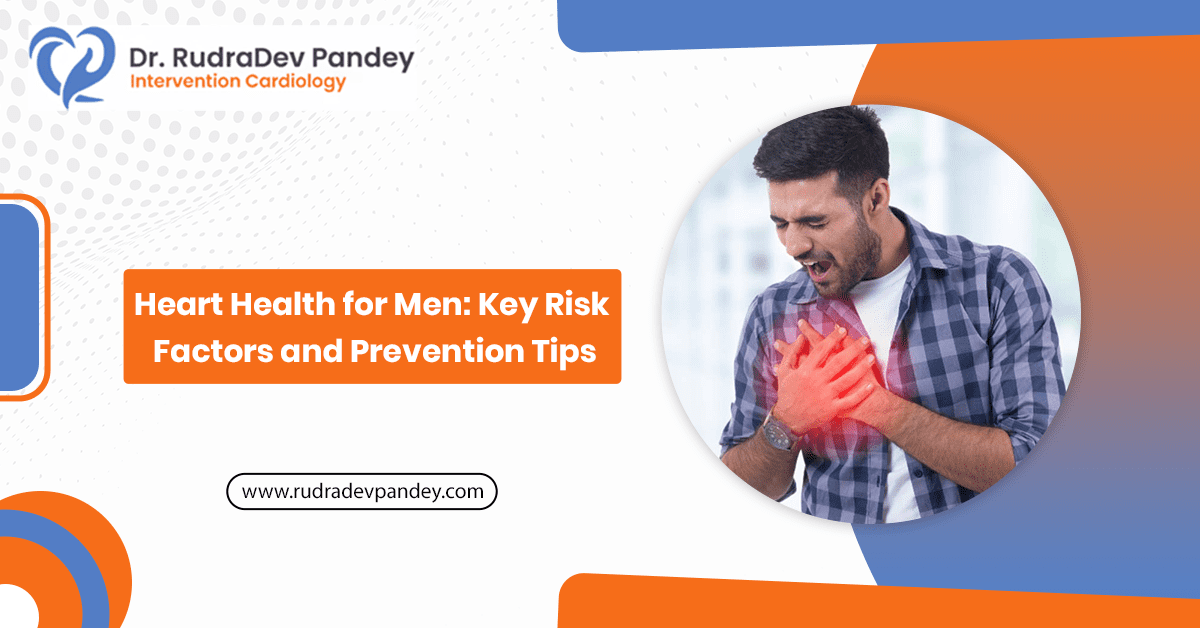
Heart Health for Men: Key Risk Factors and Prevention Tips
When it comes to overall well-being, heart health should be a top priority for men. Studies show that men are more likely than women to experience heart-related conditions at an earlier age. Unfortunately, heart disease remains the leading cause of death among men worldwide. The good news is that many risk factors for heart problems can be managed or even prevented through timely lifestyle changes and medical care.
In this blog, we will discuss the key risk factors affecting men’s heart health, common warning signs to watch for, and effective prevention tips. This information can help men take proactive steps to protect their hearts and lead healthier, longer lives.
Why Men Are at Higher Risk of Heart Disease
Several biological, lifestyle, and behavioural factors make men more prone to heart issues compared to women. Men often have higher levels of certain risk factors, such as blood pressure, cholesterol, and smoking rates. In addition, societal pressures and stress can also contribute to poor lifestyle habits that damage cardiovascular health.
Understanding these risks is the first step toward prevention.
Major Risk Factors for Heart Health in Men
1. High Blood Pressure
Hypertension, or high blood pressure, is one of the most significant risk factors for heart disease. Men are more likely to develop high blood pressure earlier in life, which can damage arteries and increase the risk of heart attacks or strokes.
2. High Cholesterol Levels
Elevated cholesterol, particularly low-density lipoprotein (LDL, also known as “bad” cholesterol), contributes to plaque buildup in the arteries. This condition, known as atherosclerosis, narrows the arteries and restricts blood flow to the heart.
3. Smoking and Tobacco Use
Cigarette smoking significantly increases the risk of coronary heart disease in men. Nicotine raises blood pressure, reduces oxygen supply to the heart, and damages the inner lining of blood vessels.
4. Diabetes
Men with diabetes have a much higher risk of heart disease compared to those without it. High blood sugar levels damage blood vessels and increase the likelihood of developing hypertension and high cholesterol.
5. Sedentary Lifestyle
Lack of regular exercise is a silent contributor to poor heart health. A sedentary lifestyle leads to obesity, high cholesterol, and reduced circulation, all of which put extra strain on the heart.
6. Obesity and Poor Diet
Men who consume diets high in processed foods, red meat, sugar, and unhealthy fats are at greater risk of heart problems. Excess body weight, especially around the abdomen, also raises blood pressure and cholesterol levels.
7. Stress and Mental Health Issues
Stress, anxiety, and depression can lead to unhealthy coping habits like overeating, smoking, or excessive drinking. Long-term stress raises cortisol levels, which negatively impacts the heart and blood vessels.
8. Family History and Genetics
If heart disease runs in the family, men are at a higher risk of developing similar conditions. Genetic factors can influence cholesterol levels, blood pressure, and heart structure.
Warning Signs Men Shouldn’t Ignore
Unlike the dramatic chest pain often portrayed in movies, heart disease symptoms in men can sometimes be subtle. Being aware of these signs is crucial for early detection and treatment.
- Chest discomfort or tightness
- Shortness of breath during activity or rest
- Unexplained fatigue or weakness
- Pain in the neck, jaw, or left arm
- Dizziness or lightheadedness
- Cold sweats
Ignoring these symptoms can be dangerous. If any of these warning signs appear, immediate medical attention should be sought.
Prevention Tips for Better Heart Health
The positive aspect is that many lifestyle adjustments can significantly reduce the risk of heart disease. Here are effective prevention strategies for men:
1. Adopt a Heart-Healthy Diet
- Eat more fruits, vegetables, whole grains, and lean proteins.
- Reduce intake of saturated fats, trans fats, and sugary foods.
- Include heart-healthy fats like omega-3s from fish, flaxseeds, and walnuts.
- Limit sodium to manage blood pressure.
2. Exercise Regularly
- Aim for at least 150 minutes of moderate-intensity exercise per week, such as brisk walking, cycling, or swimming.
- Strength training twice a week also supports heart and overall health.
3. Maintain a Healthy Weight
Keeping body weight in check reduces the risk of hypertension, high cholesterol, and diabetes—all of which are harmful to the heart.
4. Quit Smoking and Limit Alcohol
Eliminating tobacco use is one of the most effective ways to improve heart health. Alcohol should be consumed in moderation or avoided completely.
5. Manage Stress Effectively
Stress management techniques like meditation, yoga, and breathing exercises can significantly reduce cardiovascular strain. Engaging in hobbies and spending time with loved ones also helps.
6. Regular Health Check-ups
Routine screenings for blood pressure, cholesterol, and blood sugar levels help detect potential problems early. Men over 40, or those with a family history, should consider annual heart check-ups.
7. Get Quality Sleep
Aim for 7–8 hours of sleep per night. Poor sleep patterns increase the risk of obesity, diabetes, and hypertension, which all contribute to heart disease.
Role of Specialists in Men’s Heart Health
Professional guidance plays a vital role in preventing and managing cardiovascular diseases. Consulting a Heart Specialist in Jaipur can help men identify risk factors early, undergo necessary screenings, and receive expert treatment. An experienced Cardiologist in Jaipur, like Dr. RudraDev Pandey, provides comprehensive care, from preventive advice to advanced treatments, ensuring better long-term heart health for men.
Conclusion
Men face unique challenges when it comes to maintaining heart health, but awareness and proactive steps can make all the difference. By managing lifestyle factors such as diet, exercise, stress, and smoking, men can significantly reduce their risk of heart disease. Regular health check-ups and consultation with experienced heart specialists are essential for early detection and prevention.
